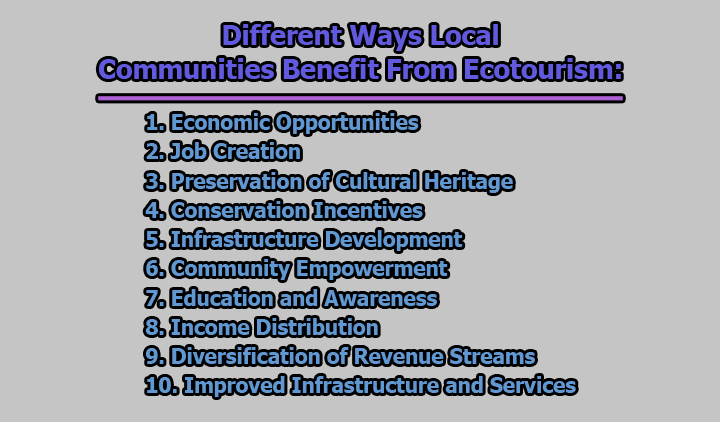Different Ways Local Communities Benefit From Ecotourism:
Ecotourism, when managed sustainably, can offer numerous benefits to local communities, fostering economic, social, and environmental well-being. Here are the different ways local communities benefit from ecotourism:
1. Economic Opportunities: Ecotourism presents local communities with a valuable avenue for economic growth and development. Tourists visiting ecotourism destinations contribute to the local economy by spending money on accommodation, meals, transportation, and various services. This expenditure creates a ripple effect, stimulating other sectors such as agriculture, handicrafts, and transportation. For example, local farmers may supply organic produce to eco-lodges, artisans may sell traditional crafts to visitors, and transport providers may offer guided tours or shuttle services. The infusion of tourism dollars injects vitality into the community’s economy, supporting small businesses and entrepreneurs. Moreover, ecotourism revenue can be reinvested in community development projects, such as infrastructure improvements, healthcare facilities, and education programs, further enhancing economic opportunities for residents.
2. Job Creation: One of the most significant benefits of ecotourism is its capacity to generate employment opportunities for local residents. As ecotourism destinations attract visitors, they create demand for various services, leading to job creation across multiple sectors. Tour guides, park rangers, hospitality staff, drivers, cooks, artisans, and conservationists are just a few examples of the diverse roles that locals can fill within the ecotourism industry. These jobs not only provide steady income but also offer opportunities for skills development and career advancement. Additionally, by hiring local residents, ecotourism businesses foster a sense of ownership and pride within the community, as residents become directly involved in showcasing their region’s natural and cultural heritage to visitors.
3. Preservation of Cultural Heritage: Ecotourism destinations often boast rich cultural heritage, including traditional practices, rituals, languages, arts, and architecture. By attracting visitors who are interested in experiencing local cultures authentically, ecotourism contributes to the preservation and promotion of these cultural assets. Local communities can showcase their unique traditions through guided tours, cultural performances, storytelling sessions, and hands-on experiences, allowing visitors to gain insights into indigenous lifestyles and worldviews. As tourists engage with local culture, they not only support community-based initiatives but also foster cross-cultural understanding and appreciation. Moreover, the economic benefits derived from cultural tourism can incentivize communities to safeguard their heritage, ensuring its continuity for future generations.
4. Conservation Incentives: Ecotourism relies heavily on the conservation of natural resources, wildlife habitats, and ecosystems. Consequently, local communities engaged in ecotourism become key stakeholders in environmental conservation efforts. The preservation of pristine landscapes, biodiversity hotspots, and endangered species not only enhances the attractiveness of ecotourism destinations but also sustains the ecological balance upon which local livelihoods depend. Communities may implement measures to protect sensitive habitats, regulate human-wildlife interactions, and promote sustainable resource management practices to ensure the long-term viability of their tourism assets. Additionally, ecotourism revenue can be reinvested in conservation projects, such as wildlife monitoring, habitat restoration, and anti-poaching initiatives, further strengthening the link between tourism and conservation.
5. Infrastructure Development: The growth of ecotourism often necessitates infrastructure development in destination areas, benefiting both tourists and local residents. Improved infrastructure, including roads, bridges, airports, and communication networks, enhances accessibility to ecotourism sites, making them more appealing to visitors. Additionally, the construction of eco-lodges, visitor centers, trails, and viewing platforms enhances the tourism experience while providing employment opportunities for local laborers and contractors. Furthermore, upgraded infrastructure not only facilitates tourism but also improves the quality of life for residents by enhancing access to essential services such as healthcare, education, and emergency response. As a result, communities experience tangible improvements in their standard of living and overall well-being, thanks to the development spurred by ecotourism initiatives.
6. Community Empowerment: Ecotourism initiatives often involve local communities in decision-making processes, empowering them to take ownership of tourism development in their area. Through participatory approaches, communities can voice their concerns, express their preferences, and contribute to the design and management of ecotourism activities. This involvement fosters a sense of empowerment, as residents gain agency over their economic and social development. Moreover, community-led ecotourism projects enable locals to retain control over their natural and cultural resources, ensuring that benefits are distributed equitably and that development aligns with community values and priorities. By empowering local communities, ecotourism contributes to sustainable, inclusive development that respects the rights and aspirations of residents.
7. Education and Awareness: Ecotourism provides opportunities for both visitors and locals to learn about environmental conservation, cultural heritage, and sustainable living practices. Through guided tours, interpretive signage, educational programs, and interactive experiences, tourists gain insights into local ecosystems, wildlife behavior, and conservation challenges. Likewise, local residents can share their knowledge, traditions, and ancestral wisdom with visitors, fostering cross-cultural exchange and mutual understanding. Ecotourism also raises awareness about environmental issues such as habitat loss, climate change, and wildlife poaching, inspiring individuals to adopt more sustainable behaviors and support conservation efforts. By educating both tourists and locals, ecotourism contributes to a greater appreciation of nature and culture, promoting responsible travel practices and environmental stewardship.
8. Income Distribution: Unlike conventional tourism, which often concentrates wealth in the hands of large corporations or foreign investors, ecotourism tends to distribute income more evenly among local stakeholders. By engaging local businesses, entrepreneurs, and service providers, ecotourism channels revenue directly into the communities where tourism activities occur. Small-scale enterprises such as family-owned guesthouses, community-based tour operators, and artisan cooperatives benefit from increased patronage, allowing profits to circulate within the local economy. Moreover, ecotourism fosters social entrepreneurship and capacity-building initiatives that empower marginalized groups, including women, indigenous peoples, and rural communities, to access economic opportunities and improve their livelihoods. By promoting inclusive growth and equitable income distribution, ecotourism contributes to poverty reduction and social cohesion within communities.
9. Diversification of Revenue Streams: Ecotourism provides local communities with an alternative source of income, reducing dependence on single industries or activities that may be vulnerable to economic fluctuations or environmental degradation. By diversifying revenue streams, communities can spread risk and build resilience against external shocks such as market downturns, natural disasters, or resource depletion. For example, rural communities that traditionally relied on agriculture or extractive industries may supplement their income by offering ecotourism experiences that showcase their natural and cultural assets. This diversification not only enhances economic stability but also promotes sustainable land use practices, as communities balance conservation with economic development. By embracing ecotourism as part of a diversified economic strategy, communities can secure long-term prosperity while safeguarding their natural and cultural heritage for future generations.
10. Improved Infrastructure and Services: As ecotourism destinations develop, local infrastructure and services improve to meet the needs of both tourists and residents. Investments in infrastructure, such as roads, electricity, water supply, and waste management systems, enhance the overall quality of life for community members. Residents benefit from improved access to essential services such as healthcare, education, and telecommunications, which may have previously been lacking or inadequate. Additionally, upgraded infrastructure supports local businesses by reducing transportation costs, increasing market access, and improving connectivity with regional and international markets. As a result, communities experience enhanced social and economic development, with better infrastructure and services contributing to higher living standards, increased opportunities for entrepreneurship, and a more vibrant local economy.
In conclusion, ecotourism can bring about multifaceted benefits for local communities, ranging from economic prosperity and cultural preservation to environmental conservation and community empowerment. However, it’s essential to implement ecotourism initiatives mindfully, ensuring that they prioritize sustainability, local participation, and long-term benefits for both people and the environment.

Library Lecturer at Nurul Amin Degree College










